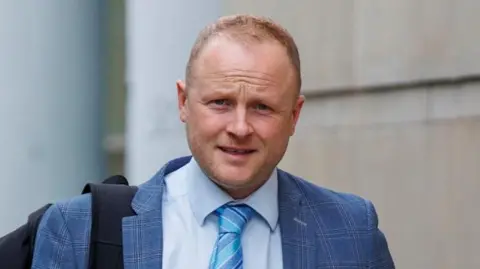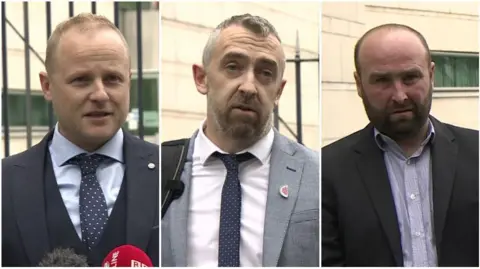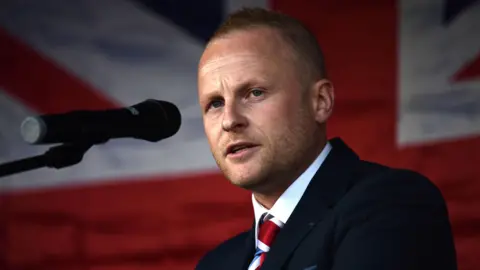Judge considers action over his belief Bryson lied in court
 PA Media
PA MediaThe judge in the trial involving loyalist activist Jamie Bryson is considering whether action is required over a "lie" that was told in court.
Although Judge Gordon Kerr KC acquitted Mr Bryson, he said he believed he had lied in part of his evidence.
This was later rejected by Mr Bryson who insisted he told the truth at all times.
After a four-week trial, he was found not guilty on a charge of conspiracy to commit misconduct in public office.
The case related to a Stormont committee hearing in September 2015 on the National Asset Management Agency, known as Nama.
Questions have been asked since the conclusion of the Belfast trial as to whether any action might be taken against Mr Bryson.
A spokesperson for the Lady Chief Justice's Office said Judge Kerr is "considering whether action is needed in light of his view that Mr Bryson lied to the court".
In a statement, the Police Service of Northern Ireland (PSNI) said: "We await the judge's full written ruling and, in consultation with the Public Prosecution Service, will consider our next steps."
What was the alleged lie about?
The part of Mr Bryson's evidence that the judge highlighted related to his dealings in 2015 with the then Sinn Féin politician Daithí McKay and party worker Thomas O'Hara.
Mr McKay was the chairman of a Stormont committee which was scrutinising the multi-million pound sale of Nama's Northern Ireland property loans portfolio.
Mr Bryson, who was due to given evidence to the committee, told the court he did not realise that when he was sending Twitter messages to Mr O'Hara, they were being relayed directly to Mr McKay.

The judge did not believe Mr Bryson in that regard, and said he "lied on oath".
Judge Kerr added: "Mr Bryson may have his reasons for lying.
"He has lived with this for 10 years, the investigation and charges for five. He has moved on and is seeking a new career.
"It may be that he felt by distancing himself from Mr McKay it would help him."
Bryson calls on PPS director to resign
During a wide-ranging interview on the BBC's Nolan Show on Friday, Mr Bryson denied lying on oath but accepted the trial judge "took a different view".
"I told the truth to the court," he said.
"I did not believe Daithí McKay was involved [in the message exchange]."
Mr Bryson added he had "absolute respect for Judge Kerr" and described him as "almost a bit of a legal idol of mine".
"I'm not attacking him in any shape or form but I disagree with him on this and I think he got that wrong."
However, Mr Bryson was highly critical of how the Public Prosecution Service (PPS) handled the case and he called on its director to resign over the issue.
"The director of the Public Prosecution Service should be writing two letters today - one of apology to me and two, offering his resignation."
In a statement to the Nolan Show, a PPS spokesperson said when police submitted a file to the organisation it had a "duty to decide whether the case meets the test for prosection".
"If it does, a prosecution will be brought," the spokesperson said.
"The PPS took the decision to prosecute after a team of experienced lawyers, including independent senior counsel, carefully examined all the evidence in the investigation file.
"We determined that the test for prosecution was met in respect of the three reported individuals.
"This means that the available evidence provided a reasonable prospect of conviction in court, and that it was in the public interest to prosecute."
The PPS declined to comment on Mr Bryson's call for director Stephen Herron to resign.
Trial stalled Bryson's legal 'dream'
Mr Bryson also alleged there was an ongoing campaign by unnamed "establishment" figures to prevent him realising his ambition to become a barrister.
"The notion that me - this upstart loyalist with my controversial views - would dare to believe that I will go to the bar, that I will enter their cosy club just simply fills people with fury and they want to do everything in their power to stop that," he said.
"If you ask me what is my dream - I want to kick the door to the bar library open, enter that with my wig and gown on and I want a stream of working-class loyalists coming behind me."
 Getty Images
Getty ImagesThe activist studied law through the Open University and revealed that he had achieved enough marks to expect a first class honours degree in October.
He said his route to taking further legal exams had to be put on hold while the Nama criminal case was ongoing, but after being acquitted he now hoped to resume that process.
Throughout the trial, Mr Bryson insisted he did nothing wrong and all his actions regarding the Stormont committee were political not criminal.
Mr McKay and Mr O'Hara were also on trial - with Mr McKay accused of misconduct in a public office and Mr O'Hara accused of charge of conspiring with Mr Bryson and Mr McKay to commit an offence of misconduct in a public office.
They too were both acquitted of the charges against them.
Minister defends involvement in separate case
Meanwhile Communities Minister Gordon Lyons has defended his decision to intervene in a separate High Court case involving Mr Bryson.
Lyons was asked by BBC News NI if Judge Kerr's comments were cause for concern, or if he felt they raised a credibility issue.
The action was taken against the Department for Infrastructure over Irish language signage at Grand Central Station in Belfast.
Mr Bryson was granted leave to seek a judicial review into Infrastructure Minister Liz Kimmins' decision to approve the £150,000 scheme.
Mr Lyons was granted participation status in the case after arguing the decision taken by Kimmins was both controversial and cut across his own Stormont department's responsibilities.
"I was left with no alternative but to take a case, but that case had already been taken so what I can do is intervene," he told BBC Radio Ulster's Evening Extra programme.
"This isn't a comment on individuals, or who is bringing the case.
"This is the case that is now live, I am not able to bring my own case because leave was already granted on the one that is there.
"That is not a commentary on any individual that is taking this, however, I have a responsibility to provide evidence that is useful in a case that is in front of the court and that is what I am doing."
